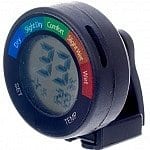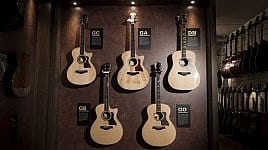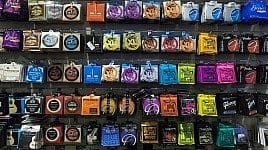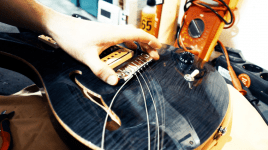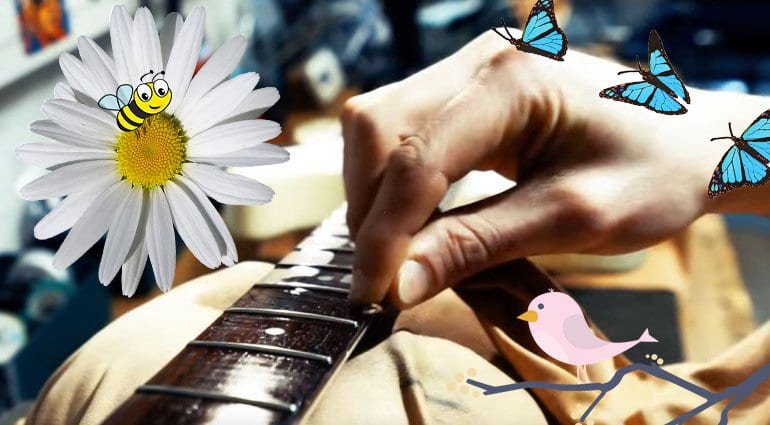
Winter is finally over and it’s time for the big spring clean. But before you jump right into polishing up your guitar, it is first necessary to carry out a small inspection and see how well it survived the cold season. This applies to all guitars, whether acoustic or electric.
Inspection
Central heating, during those cozy winters is loved by all, but by guitars not so much. If there is one thing that’s unforgiving, even for the less sensitive instruments, is too dry air. Slide your thumb and forefinger along the neck of your guitar. If you notice any frets clearly sticking out the edge, then you need to take action, as the too dry air deprived the wood of moisture and made it shrink.
If your room has a high humidity, you can leave your instrument there for a few days, and with a bit of luck, it will recover. The more elegant solution, which keeps them in top shape all year round, is the use of special guitar humidifiers. These are available in a wide variety of designs, such as the Taylor Guitar Humidifier, Planet Waves PW-GH, Grover Humidifier 7960, which attach to the soundhole of your guitar or the Dunlop Herco guitar Humdifier HE360 and the Planet Waves PW-SIH-01 to keep the humidity in the guitar case at a healthy level. It is also advisable to check the condition of your guitar from time to time. The Harley Benton Humi Doctor which indicates the current humidity in percentage is ideal for this purpose.
If the spring inspection does not reveal any problems, then you can start with the maintenance program and your guitar will look as good as new soon again.
All wood and varnish types are different, which means you should first find out what type of wood your guitar is, whether it is lacquered, and if so, what type of lacquer. Check whether the manufacturer provided care instructions which you need to follow, as not all cleaning products are suitable for all guitars. When in doubt, you can always contact our experts who will have the answers to all your questions.
Here are some tips on how to proceed including the necessary products.
Neck
It is easier to clean necks and fretboards which are lacquered, as the cleaning agents used can later also be used for the body. Caution should be exercised with older guitars, where the lacquered layer has defects or with bright maple fretboards. Here, the cleaning should be done dry, as liquid detergents can cause discoloration. For non-lacquered rosewood or ebony fretboards, we recommend Sandberg Fingerboard Oil, Dunlop Lemon Oil, Viol Cleaning Fluid or specially designed products such as Dunlop Formula 65 Fretboard Kit.
The PRS PS-ACC-3131 Polishing Cloth is not just one of the best products on the market, but it is one of the many products we have to offer which will ensure thorough cleaning without scratching the surface. For stubborn dirt give it a light soak, as for very dark fretboards you can use steel wool at 0000 or finer. Those who prefer an all-in-one solution, can choose a cleaning agent such as the GHS Gorgomyte.
Tip: Loosen the strings and remove them from the nut for easier access.
Strings
If the strings remain on the guitar, care products such as the GHS Fast Fret or special string cleaners such as the Dunlop Formula65 and Fender Slick Speed will not only clean the strings and make them more durable, but also does well for the fretboard. A cleaning agent and conditioner combo, such as the D’Addario XLR8 String Lubricant & Cleaner Set, improve the longevity of the strings while simultaneously reducing noise when playing.
Tip: Coated strings generally do not require any special cleaning agents, cleanliness is ensured by wiping them with a lint-free, slightly moist cloth after playing. The first choice is high quality microfiber cloths like the Lakewood Microfiber Polishing Cloth.
Frets
Not only does fine steel wool make un-lacquered fretboards look as good as new, they also polish the frets. To give the frets a more intense treatment, there are special polishing cloths or sets available such as the Dunlop Micro Fine Guitar Polish 5410 or the Göldo Fret Polishing Rubber.
Tip: The Göldo WS045 Fretboard Guard is recommended to protect the wood between the frets. Do not forget to cover the pickups, or else they will collect the metal debris from the frets and steel!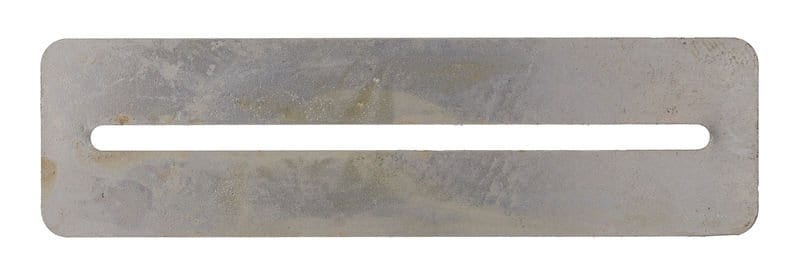
Hardware
Once the fretboard and frets are done, it’s time to clean the hardware. Cleaning agents like the Harley Benton Hardware Polish or the Fender Custom Shop Guitar Polish, will provide bridges, tuning heads and all other metal parts a new shine to them. Lubricants such as the Gewa Micro Teflon, ensure for smooth operating tuning heads, as for the saddle, lubricants such as Big Bends Nut Sauce, Super Vee Super Glide Nut Evolution are recommended.
Body
The easiest way to maintain your guitar is to use product sets such as the d’Andrea Guitar Care Kit Deluxe or the Dunlop Maintenance Kit, which usually contains everything you need. But of course in our wide selection, you will also find a lot of individual cleaning and polishing agents, specific to the type of lacquer or wood of your guitar. Some in the form of a spray like the Dunlop Formula No. 65 or as a cream like the PRS Polish ACC- 3111, as well as wax products such as Dunlop Carnauba Wax, or wax-free products like the GHS Gloss Non-Wax. Many brands offer their own care products for their guitars, which guarantee a risk-free application for special surfaces or varnishes. This includes the Gibson Luthiers Choice AILC-975 as well as the Fender CS Deluxe Guitar Care Kit.
These suggestions apply largely to acoustic guitars. However, it is imperative that you follow the manufacturer’s maintenance instructions, because detailed information about lacquers or other finishes are often rare.
Tip: Special cleaning and care agents such as the Planet Waves PW-MPC is not a luxury, as common cotton household rags frequently leave thin marks and scratches on the lacquer.
One more for the road: of course you can loosen the strings when cleaning the guitar. But the easiest is when it’s “naked” in front of you and you can reach every corner effortlessly. Plus a fresh set of strings crowns it all, and makes for the perfect finalisation to a great spring clean.
Do you have any questions or comments? We look forward to your feedback!
You are currently viewing a placeholder content from Facebook. To access the actual content, click the button below. Please note that doing so will share data with third-party providers.
More InformationYou are currently viewing a placeholder content from Instagram. To access the actual content, click the button below. Please note that doing so will share data with third-party providers.
More InformationYou are currently viewing a placeholder content from X. To access the actual content, click the button below. Please note that doing so will share data with third-party providers.
More Information